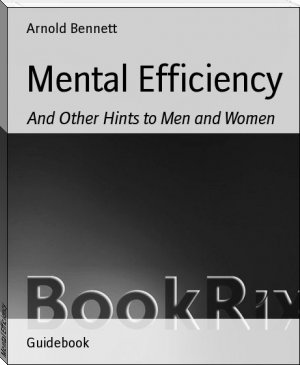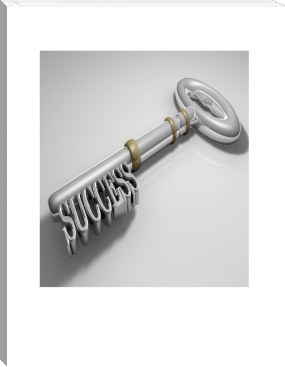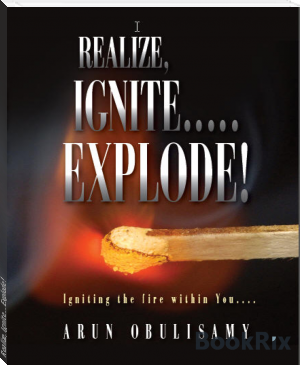Mental Efficiency by Arnold Bennett (top 100 books of all time checklist .TXT) 📖

- Author: Arnold Bennett
Book online «Mental Efficiency by Arnold Bennett (top 100 books of all time checklist .TXT) 📖». Author Arnold Bennett
And lo! I, at the age of nearly forty, am putting to myself the old questions concerning the intrinsic value of life, the fundamentally important questions: What have I got out of it? What am I likely to get out of it? In a word, what's it worth? If a man can ask himself a question more momentous, radical, and critical than these questions, I would like to know what it is. Innumerable philosophers have tried to answer these questions in a general way for the average individual, and possibly they have succeeded pretty well. Possibly I might derive benefit from a perusal of their answers. But do you suppose I am going to read them? Not I! Do you suppose that I can recall the wisdom that I happen already to have read? Not I! My mind is a perfect blank at this moment in regard to the wisdom of others on the essential question. Strange, is it not? But quite a common experience, I believe. Besides, I don't actually care twopence what any other philosopher has replied to my question. In this, each man must be his own philosopher. There is an instinct in the profound egoism of human nature which prevents us from accepting such ready-made answers. What is it to us what Plato thought? Nothing. And thus the question remains ever new, and ever unanswered, and ever of dramatic interest. The singular, the highly singular thing is--and here I arrive at my point--that so few people put the question to themselves in time, that so many put it too late, or even die without putting it.
I am firmly convinced that an immense proportion of my instructed fellow-creatures do not merely omit to strike the balance-sheet of their lives, they omit even the preliminary operation of taking stock. They go on, and on, and on, buying and selling they know not what, at unascertained prices, dropping money into the till and taking it out. They don't know what goods are in the shop, nor what amount is in the till, but they have a clear impression that the living-room behind the shop is by no means as luxurious and as well-ventilated as they would like it to be. And the years pass, and that beautiful furniture and that system of ventilation are not achieved. And then one day they die, and friends come to the funeral and remark: "Dear me! How stuffy this room is, and the shop's practically full of trash!" Or, some little time before they are dead, they stay later than usual in the shop one evening, and make up their minds to take stock and count the till, and the disillusion lays them low, and they struggle into the living-room and murmur: "I shall never have that beautiful furniture, and I shall never have that system of ventilation. If I had known earlier, I would have at least got a few inexpensive cushions to go on with, and I would have put my fist through a pane in the window. But it's too late now. I'm used to Windsor chairs, and I should feel the draught horribly."
If I were a preacher, and if I hadn't got more than enough to do in minding my own affairs, and if I could look any one in the face and deny that I too had pursued for nearly forty years the great British policy of muddling through and hoping for the best--in short, if things were not what they are, I would hire the Alhambra Theatre or Exeter Hall of a Sunday night--preferably the Alhambra, because more people would come to my entertainment--and I would invite all men and women over twenty-six. I would supply the seething crowd with what they desired in the way of bodily refreshment (except spirits--I would draw the line at poisons), and having got them and myself into a nice amiable expansive frame of mind, I would thus address them--of course in ringing eloquence that John Bright might have envied:
Men and women (I would say), companions in the universal pastime
of hiding one's head in the sand,--I am about to impart to you the
very essence of human wisdom. It is not abstract. It is a
principle of daily application, affecting the daily round in its
entirety, from the straphanging on the District Railway in the
morning to the straphanging on the District Railway the next
morning. Beware of hope, and beware of ambition! Each is
excellently tonic, like German competition, in moderation. But all
of you are suffering from self-indulgence in the first, and very
many of you are ruining your constitutions with the second. Be it
known unto you, my dear men and women, that existence rightly
considered is a fair compromise between two instincts--the
instinct of hoping one day to live, and the instinct to live here
and now. In most of you the first instinct has simply got the
other by the throat and is throttling it. Prepare to live by all
means, but for heaven's sake do not forget to live. You will never
have a better chance than you have at present. You may think you
will have, but you are mistaken. Pardon this bluntness. Surely you
are not so naive as to imagine that the road on the other side of
that hill there is more beautiful than the piece you are now
traversing! Hopes are never realized; for in the act of
realization they become something else. Ambitions may be attained,
but ambitions attained are rather like burnt coal, ninety per
cent. of the heat generated has gone up the chimney instead of
into the room. Nevertheless, indulge in hopes and ambitions,
which, though deceiving, are agreeable deceptions; let them cheat
you a little, a lot. But do not let them cheat you too much. This
that you are living now is life itself--it is much more life
itself than that which you will be living twenty years hence.
Grasp that truth. Dwell on it. Absorb it. Let it influence your
conduct, to the end that neither the present nor the future be
neglected. You search for happiness? Happiness is chiefly a matter
of temperament. It is exceedingly improbable that you will by
struggling gain more happiness than you already possess. In fine,
settle down at once into _life_. (Loud cheers.)
The cheers would of course be for the refreshments.
There is no doubt that the mass of the audience would consider that I had missed my vocation, and ought to have been a caterer instead of a preacher. But, once started, I would not be discouraged. I would keep on, Sunday night after Sunday night. Our leading advertisers have richly proved that the public will believe anything if they are told of it often enough. I would practise iteration, always with refreshments. In the result, it would dawn upon the corporate mind that there was some glimmering of sense in my doctrine, and people would at last begin to perceive the folly of neglecting to savour the present, the folly of assuming that the future can be essentially different from the present, the fatuity of dying before they have begun to live.
V
MARRIAGE
THE DUTY OF IT
Every now and then it becomes necessary to deal faithfully with that immortal type of person, the praiser of the past at the expense of the present. I will not quote Horace, as by all the traditions of letters I ought to do, because Horace, like the incurable trimmer that he was, "hedged" on this question; and I do not admire him much either. The praiser of the past has been very rife lately. He has told us that pauperism and lunacy are mightily increasing, and though the exact opposite has been proved to be the case and he has apologized, he will have forgotten the correction in a few months, and will break out again into renewed lamentation. He has told us that we are physically deteriorating, and in such awful tones that we have shuddered, and many of us have believed. And considering that the death-rate is decreasing, that slums are decreasing, that disease is decreasing, that the agricultural labourer eats more than ever he did, our credence does not do much credit to our reasoning powers, does it? Of course, there is that terrible "influx" into the towns, but I for one should be much interested to know wherein the existence of the rustic in times past was healthier than the existence of the town-dwellers of to-day. The personal appearance of agricultural veterans does not help me; they resemble starved 'bus-drivers twisted out of shape by lightning.
But the _piece de resistance_ of the praiser of the past is now marriage, with discreet hints about the birth-rate. The praiser of the past is going to have a magnificent time with the subject of marriage. The first moanings of the tempest have already been heard. Bishops have looked askance at the birth-rate, and have mentioned their displeasure. The matter is serious. As the phrase goes, "it strikes at the root." We are marrying later, my friends. Some of us, in the hurry and pre-occupation of business, are quite forgetting to marry. It is the duty of the citizen to marry and have children, and we are neglecting our duty, we are growing selfish! No longer are produced the glorious "quiverfuls" of old times! Our fathers married at twenty; we marry at thirty-five. Why? Because a gross and enervating luxury has overtaken us. What will become of England if this continues? There will be no England! Hence we must look to it! And so on, in the same strain.
I should like to ask all those who have raised and will raise such outcries. Have you read "X"? Now, the book that I refer to as "X" is a mysterious work, written rather more than a hundred years ago by an English curate. It is a classic of English science; indeed, it is one of the great scientific books of the world. It has immensely influenced all the scientific thought of the nineteenth century, especially Darwin's. Mr. H.G. Wells, as cited in "Chambers's Cyclopaedia of English Literature," describes it as "the most 'shattering' book that ever has or will be written." If I may make a personal reference, I would say that it affected me more deeply than any other scientific book that I have read. Although it is perfectly easy to understand, and free from the slightest technicality, it is the most misunderstood book in English literature, simply because it is _not_ read. The current notion about it is utterly false. It might be a powerful instrument of education, general and sociological, but publishers will not reprint it--at least, they do not. And yet it is forty times more interesting and four hundred times more educational than Gilbert White's remarks on the birds of Selborne. I will leave you to guess what "X" is, but I do not offer a prize





Comments (0)